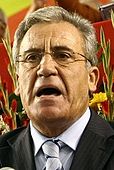Portuguese local election, 2013
|
|
|||||||||||||||||||||||||||||||||||||||||||||||||
|---|---|---|---|---|---|---|---|---|---|---|---|---|---|---|---|---|---|---|---|---|---|---|---|---|---|---|---|---|---|---|---|---|---|---|---|---|---|---|---|---|---|---|---|---|---|---|---|---|---|
|
|||||||||||||||||||||||||||||||||||||||||||||||||
|
All 308 Portuguese municipalities and 3,092Portuguese Parishes All 2,000 local government councils |
|||||||||||||||||||||||||||||||||||||||||||||||||
|
|||||||||||||||||||||||||||||||||||||||||||||||||
The Portuguese local elections of 2013 took place on 29 September. The elections consisted of three separate elections in the 308 Portuguese municipalities, the election for the Municipal Chambers, whose winner is elected mayor, another election for the Municipal Assembly, as well an election for the lower-level Parish Assembly, whose winner is elected parish president. This last will be held separately in the more than 3,000 parishes around the country. There was a reduction in the number of Parishes of more than 1000 parishes and, consequently, Parishes Assemblies and their respective leadership positions due to a local government reform undertaken by the Government led by Pedro Passos Coelho.
The process of submitting candidacies for these elections was marked by interpretation differences of the limitation of mandates law, which prohibits a candidate, after serving three terms, to run for Mayor, Municipal Assemblies or Parish Assemblies. The controversy lied in the fact that the law does not state explicitly whether it prohibits reelection candidacies for the same municipality or parish, or if, on the contrary, the candidate is barred from seeking reelection for the same position in any municipality or parish. Candidates affected by this issue included Luis Filipe Menezes (PSD), running in Porto, and Fernando Seara (PSD/CDS–PP), who was standing in Lisbon.
This controversy ended on 5 September 2013 with the decision of the Constitutional Court considering only territorial the limitation of mandates and, there so, giving permission to mayoral candidates that had already serve three consecutive mandates to run for another municipality.
The Social Democratic Party (PSD) was the biggest loser of these elections, as it lost almost a third of the municipalities that it held, although the PSD did gain several traditionally Socialist bastions like Braga and Guarda.
The Socialist Party (PS) won the largest number of municipal chambers in its history surpassing its previous best result in 2009. It also won the largest number of mayorships of any party in the history of Portugal. Despite the Socialists victory however, the PS lost to the PSD the cities of Braga and Guarda and to the CDU in the cities of Loures, Beja and Évora. The PS also reconquered Coimbra and won in two large social democratic strongholds, Vila Real and Funchal.
...
Wikipedia



